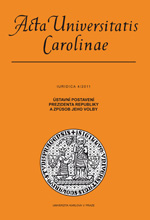Nominace kandidátů na funkci prezidenta republiky, pasivní volební právo a volební systém prezidenta republiky ve vybraných státech Evropské unie
Nomination of Candidates for the Function of President of the Republic, Right to Be Elected and Election System in Selected Countries of EU
Author(s): Jiří HřebejkSubject(s): Law, Constitution, Jurisprudence
Published by: Univerzita Karlova v Praze, Nakladatelství Karolinum
Keywords: president; direct elections; condititions; constitution; European Union
Summary/Abstract: As of beginning of 2012, 12 states (excluding the Czech Republic) out of 27 EU Member States elect the president of the republic directly. In 8 states (including the Czech Republic), the president of the republic is elected in the indirect way; 7 states are monarchies in which the head of state is not regularly elected. The Czech Republic should become another state with the direct election of the president of the republic from 1 October 2012 because the Chamber of Deputies and the Senate approved the relavant amendment to the Constitution of the Czech Republic (in December 2011 and February 2012 respectively). The constitutional change, i.e. the passing from the traditional indirect election of the president of the republic to the direct election, is a novelty in the Czech Republic and as such may encounter “childhood ilnesses”. On the other hand, direct elections do take place in the Czech Republic and have been tried out several times. It is possible to make use of the existing legal regulation and take advantage of the factual experience. This claim is supported by the fact that the approved method of the direct election of the president of the republic to some extent copies the election model according to which senators are elected in the Czech Republic every two years since 1996. It is based on the majority electoral system with the possibility of two round election. The paper explores the method of nominating candidates in a comparative way and points out that the requirement of submitting a petition signed by at least 50,000 citizens, imposed by the constitutional amendment, is the second strictest in EU Member States (after Poland). In addition, a comparative table in the paper deals with constitutional requirements for passive suffrage in EU Member States and their electoral systems and accentuates relevant passages of constitutional texts in these states concerning the direct election of the president of the republic.
Journal: Acta Universitatis Carolinae Iuridica
- Issue Year: 57/2011
- Issue No: 4
- Page Range: 165-172
- Page Count: 8
- Language: Czech

